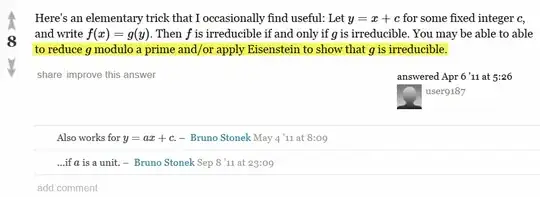I'm trying to understand this answer which I copy here (I didn't ask to the user because he left MSE).

Could someone verify if my answer is correct and help me to understand the highlighted statement, maybe giving me a concrete example?
My attempt:
$\Leftarrow$
If $f$ is reducible, then $f(x)=h_1(x)h_2(x)=g(x+c)$, then $g(x)=h_1(x-c)h_2(x-c)$, so $g(x)$ is reducible.
$\Rightarrow$
If $g(x)$ is reducible, then $g(x)=h_1(x)h_2(x)=f(x-c)$, then $f(x)=h_1(x+c)h_2(x+c)$, so $f(x)$ is reducible.
Thanks in advance